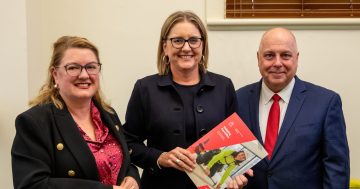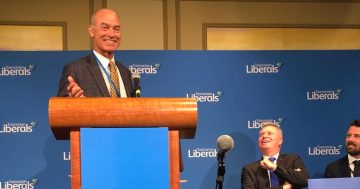
S&P Global Ratings said it expected Victoria’s AA credit rating to hold, but could wear thin if its forecasted budget surplus was not achieved. Photo: PeterJSeager.
Victoria will retain the lowest credit rating in the Commonwealth under its new budget.
This financial year Victoria’s budget will have a $2.2 billion deficit, but the government projects a return to surplus of $1.5 billion by 2025-26.
Treasurer Tim Pallas said his government was focused on moving past COVID debt by reducing net debt as a proportion of the state’s economy, which he claimed the new budget does by striking a responsible balance without taking “the economic momentum out of the economy”.
The budget forecasts a net debt of $187.8 billion by 2027-28. It said net debt represented about 20 per cent of gross state product (GSP) in 2022-23, which will rise to 25.2 per cent in 2026-27, followed by a drop to 25.1 per cent in the year after.
Credit rating agency S&P Global Ratings said the budget confirmed the government’s accounts were in “large structural fiscal cash deficit” – meaning Victoria would keep its AA credit rating, which was downgraded from AAA in 2020.
“This is the highest (large structural fiscal cash deficit) among the Australian states and stems from successive operating deficits and its large capex [capital expenditures] since the pandemic hit in late fiscal 2020,” reads the agency’s statement in response to the budget.
“Debt to operating revenues has almost tripled since this time. Victoria’s serviceability costs are also rising.
“On the flipside, we believe Victoria maintains strong access to global capital markets. This will allow the government to fund its budget and avoid any acute stress scenario, despite rising interest expenses and market volatility.”
While the new budget did not introduce any major taxes, the State Government has asked ratepayers to contribute more through its levies on fire services and waste.
The government has also discontinued its sick pay guarantee, which was introduced during COVID-19 to assist casual workers who needed to isolate.
Victorian Treasurer Tim Pallas said in a briefing prior to handing over the budget that his state had been conned by the Commonwealth, due to the “historically unfair distribution of funds”. Since 1950, he claims, every Victorian has lost around $17,000, which the introduction of GST did nothing to relieve.
“Victoria has subsidised the Federation to the tune of $30 billion under that funding instrument alone,” said Mr Pallas. “All we’re asking for, essentially, is our fair share.”











